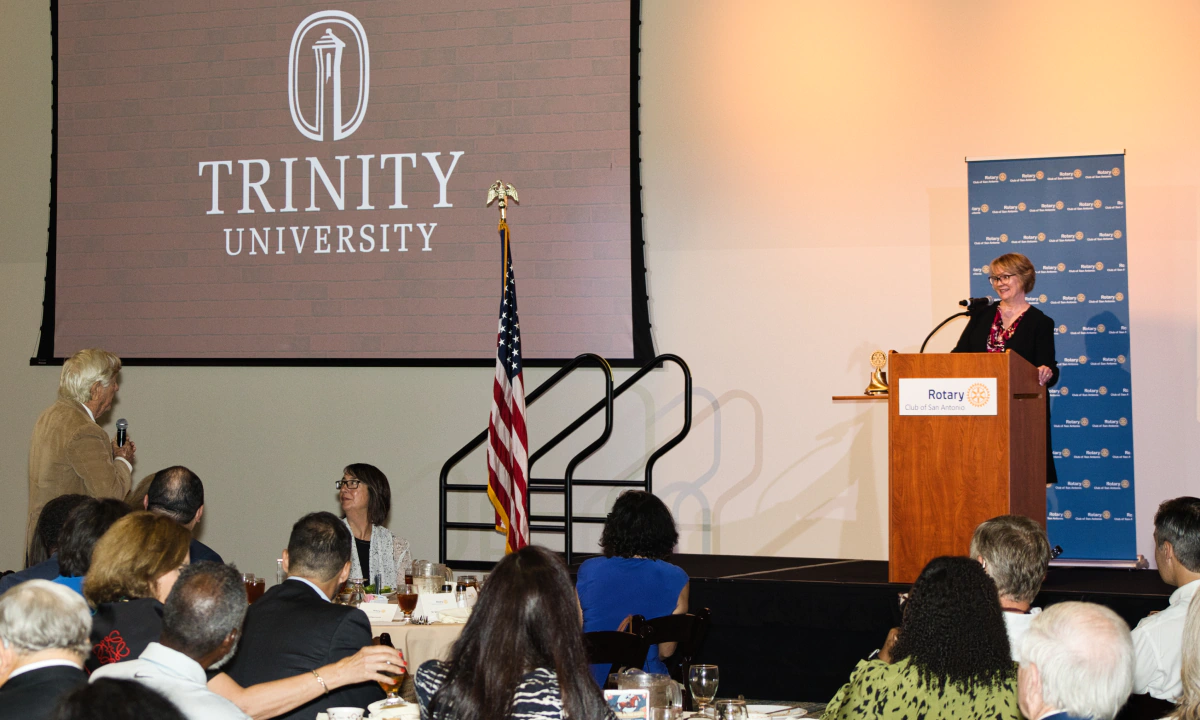

At this week’s luncheon, Rotarians welcomed Dr. Vanessa Beasley, President of Trinity University, for a wide-ranging program that blended campus updates with a compelling case for elevating listening as a civic and professional skill.
Dr. Beasley opened by acknowledging the Rotary Club’s long-standing role in fostering community and social connection. She emphasized that groups like Rotary, who gather “purely because you value the community,” play a vital role in counteracting the decline of social capital in the U.S.
Turning to Trinity University, Dr. Beasley recounted her first visit in 2014 with her son. She was immediately struck by the university’s unique combination of liberal arts attention and research-level rigor. Trinity, she said, teaches students how to think, not what to think, and encourages them to own their beliefs—a mission that resonates strongly in today’s world.
Dr. Beasley highlighted several achievements that reflect Trinity’s growing reputation:
- attracting top students with high retention,
- earning a national liberal arts ranking in the top quartile,
- a highly ranked Healthcare Management graduate program,
- and two-time recognition by Time Magazine for developing future leaders.
She also described the “Plunge” program, where new students volunteer in San Antonio before classes begin, gaining civic awareness, leadership skills, and personal growth.
From there, Dr. Beasley shifted to the heart of her talk: listening as civil discourse. Drawing on years of studying the presidency and media, she argued that our culture doesn’t suffer from a shortage of argument; it suffers from a shortage of skills for staying in hard conversations. Trinity is answering that gap with campus-wide practice and a new special-topics course called "Listening".
The 14-week course explores listening from many angles—formal debates on difficult issues like reproductive rights, practicing silence to build tolerance for discomfort, examining cognitive habits such as selective listening, and studying de-escalation techniques. A central theme is evaluating evidence and source credibility—who we listen to, why, and with what standards. The semester ends with student-produced podcasts, and every participant in the pilot reported feeling more capable of engaging with opposing views. With such results, Trinity plans to expand the course in the spring.
Beyond the classroom, Trinity is encouraging habits and spaces that invite more face-to-face dialogue. Dr. Beasley poked fun at her own “eyes-down phone” routine and has challenged students to catch her texting while walking—a playful reminder to be present.
The listening work also extends globally through a Rotary-linked partnership with Corymeela in Northern Ireland, a community devoted to reconciliation. Trinity students gain immersive experiences abroad, then return to campus to lead workshops that encourage reflection and connection across differences. These efforts are part of a broader commitment to fostering dialogue and understanding both locally and internationally.
During a brief Q&A session following her talk, Dr. Beasley addressed practical challenges. She was asked what to do if one side of a conversation refuses to listen. It’s appropriate to set boundaries, pause, or step away; shame is a poor teacher and rarely produces learning, so the goal is to reduce heat and look for islands of agreement. On AI, she framed a “two-things-can-be-true” approach: students must understand how AI works (and its biases) to thrive in the workplace, while educators must also defend the spaces where human judgment, empathy, and conversation are irreplaceable. On tuition, she acknowledged the costs associated with private education but emphasized Trinity’s commitment to access, with many students graduating debt-free at rates above the national average.
Dr. Beasley closed where she began: communities flourish when people choose to show up—curious, prepared, and willing to listen. Trinity intends to graduate such citizens and leaders. And Rotary, she suggested, is already modeling the practice.


.svg)
.svg)
.svg)
